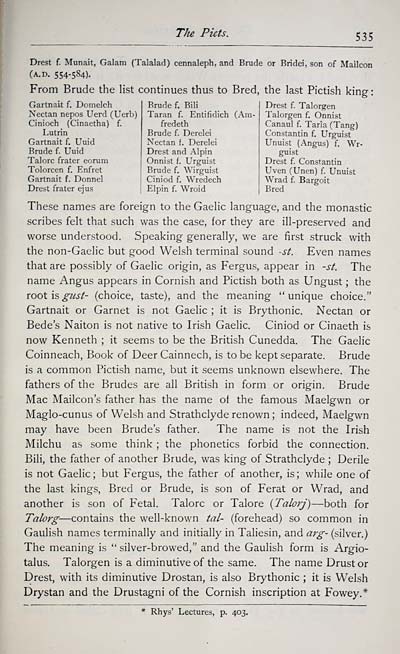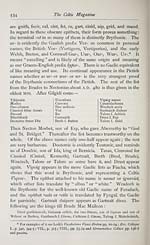Blair Collection > Celtic magazine > Volume 12
(545)
Download files
Complete book:
Individual page:
Thumbnail gallery: Grid view | List view

The Picts.
535
Drest f. Munait, Galam (Talalad) cennaleph, and Brude or Bridei, son of Mailcon
(A.D. 554-584).
From Brude the list continues thus to Bred, the last Pictish king :
Gartnait f. Domelch
Nectan nepos Uerd (Uerb)
Cinioch (Cinaetha) f.
Lutrin
Gartnait f. Uuid
Brude f. Uuid
Talorc frater eorum
Tolorcen f. Enfret
Gartnait f. Donnel
Drest frater ejus
Brude f. Bili
Taran f. Entifidich (Am-
fredeth
Brude f Derelei
Nectan f. Derelei
Drest and Alpin
Onnist f. Urguist
Brude f. Wirguist
Ciniod f. Wredech
Elpin f. Wroid
Drest I. Talorgen
Talorgen f. Onnist
Canaul f. Tarla (Tang)
Constantin f. Urguist
Unuist (Angus) f. Wr-
guist
Drest f. Constantin
Uven (Unen) f Unuist
Wrad f. Bargoit
Bred
These names are foreign to the Gaelic language, and the monastic
scribes felt that such was the case, for they are ill-preserved and
worse understood. Speaking generally, we are first struck with
the non-Gaelic but good Welsh terminal sound -st. Even names
that are possibly of Gaelic origin, as Fergus, appear in -st. The
name Angus appears in Cornish and Pictish both as Ungust ; the
root is g2ist- (choice, taste), and the meaning " unique choice."
Gartnait or Garnet is not Gaelic ; it is Brythonic. Nectan or
Bede's Naiton is not native to Irish Gaelic. Ciniod or Cinaeth is
now Kenneth ; it seems to be the British Cunedda. The Gaelic
Coinneach, Book of Deer Cainnech, is to be kept separate. Brude
is a common Pictish name, but it seems unknown elsewhere. The
fathers of the Brudes are all British in form or origin. Brude
Mac Mailcon's father has the name of the famous Maelgwn or
Maglo-cunus of Welsh and Strathclyde renown ; indeed, Maelgwn
may have been Brude's father. The name is not the Irish
Milchu as some think ; the phonetics forbid the connection,
Bili, the father of another Brude, was king of Strathclyde ; Derile
is not Gaelic; but Fergus, the father of another, is; while one of
the last kings. Bred or Brude, is son of Ferat or Wrad, and
another is son of Fetal. Talorc or Talore {Talorj) — both for
Talorg — contains the well-known tal- (forehead) so common in
Gaulish names terminally and initially in Taliesin, and arg- (silver.)
The meaning is "silver-browed," and the Gaulish form is Argio-
talus. Talorgen is a diminutive of the same. The name Drustor
Drest, with its diminutive Drostan, is also Brythonic ; it is Welsh
Drystan and the Drustagni of the Cornish inscription at Fowey.*
* Rhys' Lectures, p. 403.
535
Drest f. Munait, Galam (Talalad) cennaleph, and Brude or Bridei, son of Mailcon
(A.D. 554-584).
From Brude the list continues thus to Bred, the last Pictish king :
Gartnait f. Domelch
Nectan nepos Uerd (Uerb)
Cinioch (Cinaetha) f.
Lutrin
Gartnait f. Uuid
Brude f. Uuid
Talorc frater eorum
Tolorcen f. Enfret
Gartnait f. Donnel
Drest frater ejus
Brude f. Bili
Taran f. Entifidich (Am-
fredeth
Brude f Derelei
Nectan f. Derelei
Drest and Alpin
Onnist f. Urguist
Brude f. Wirguist
Ciniod f. Wredech
Elpin f. Wroid
Drest I. Talorgen
Talorgen f. Onnist
Canaul f. Tarla (Tang)
Constantin f. Urguist
Unuist (Angus) f. Wr-
guist
Drest f. Constantin
Uven (Unen) f Unuist
Wrad f. Bargoit
Bred
These names are foreign to the Gaelic language, and the monastic
scribes felt that such was the case, for they are ill-preserved and
worse understood. Speaking generally, we are first struck with
the non-Gaelic but good Welsh terminal sound -st. Even names
that are possibly of Gaelic origin, as Fergus, appear in -st. The
name Angus appears in Cornish and Pictish both as Ungust ; the
root is g2ist- (choice, taste), and the meaning " unique choice."
Gartnait or Garnet is not Gaelic ; it is Brythonic. Nectan or
Bede's Naiton is not native to Irish Gaelic. Ciniod or Cinaeth is
now Kenneth ; it seems to be the British Cunedda. The Gaelic
Coinneach, Book of Deer Cainnech, is to be kept separate. Brude
is a common Pictish name, but it seems unknown elsewhere. The
fathers of the Brudes are all British in form or origin. Brude
Mac Mailcon's father has the name of the famous Maelgwn or
Maglo-cunus of Welsh and Strathclyde renown ; indeed, Maelgwn
may have been Brude's father. The name is not the Irish
Milchu as some think ; the phonetics forbid the connection,
Bili, the father of another Brude, was king of Strathclyde ; Derile
is not Gaelic; but Fergus, the father of another, is; while one of
the last kings. Bred or Brude, is son of Ferat or Wrad, and
another is son of Fetal. Talorc or Talore {Talorj) — both for
Talorg — contains the well-known tal- (forehead) so common in
Gaulish names terminally and initially in Taliesin, and arg- (silver.)
The meaning is "silver-browed," and the Gaulish form is Argio-
talus. Talorgen is a diminutive of the same. The name Drustor
Drest, with its diminutive Drostan, is also Brythonic ; it is Welsh
Drystan and the Drustagni of the Cornish inscription at Fowey.*
* Rhys' Lectures, p. 403.
Set display mode to: Large image | Transcription
Images and transcriptions on this page, including medium image downloads, may be used under the Creative Commons Attribution 4.0 International Licence unless otherwise stated. ![]()
| Early Gaelic Book Collections > Blair Collection > Celtic magazine > Volume 12 > (545) |
|---|
| Permanent URL | https://digital.nls.uk/76467025 |
|---|
| Description | Volume XII, 1887. |
|---|---|
| Shelfmark | Blair.13 |
| Attribution and copyright: |
|
| Description | A selection of books from a collection of more than 500 titles, mostly on religious and literary topics. Also includes some material dealing with other Celtic languages and societies. Collection created towards the end of the 19th century by Lady Evelyn Stewart Murray. |
|---|
| Description | Selected items from five 'Special and Named Printed Collections'. Includes books in Gaelic and other Celtic languages, works about the Gaels, their languages, literature, culture and history. |
|---|

